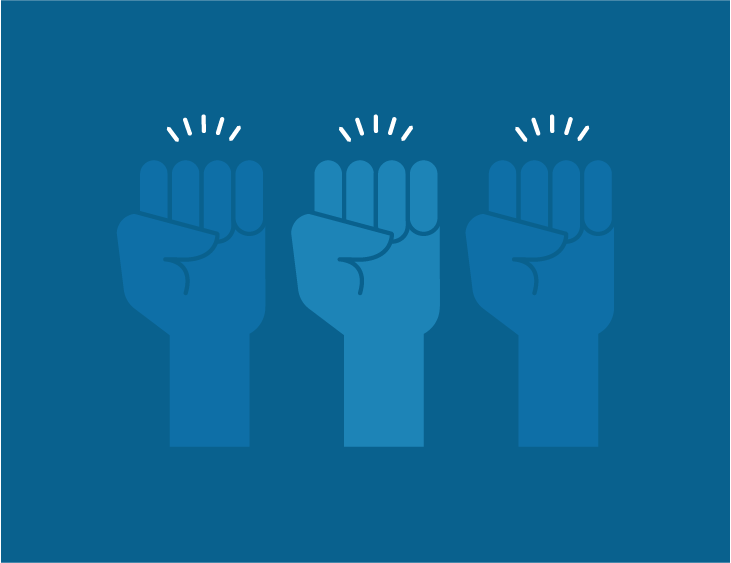
International Workers’ Day 2020: Demand a Recovery for People Not Profit
“In our hands is placed a power greater than their hoarded gold
Greater than the might of armies magnified a thousand-fold
We can bring to birth a new world from the ashes of the old
For the union makes us strong.”- Solidarity Forever, Ralph Chaplin (1915)
Commentary by VDLC President, Stephen von Sychowski
Today is International Workers’ Day, or “May Day”. Under normal circumstances we would be marching and rallying today with our fellow union members and community allies. Unfortunately, we are unable to do so this year due to the serious and legitimate concern that mass gatherings would contribute to the spread of the COVID-19 virus, thereby worsening an already devastating global pandemic.
However, while we cannot physically gather, the work of our council and of the labour movement continues. So too does the work of many frontline and critical workers across the all sectors of the economy. We thank those workers for keeping us all safe, cared for, fed, mobile, and supplied during these dangerous times.
We mark May 1st every year to express our solidarity with the struggles of our fellow workers across the planet and to remember that we are part of a global movement for a better world. We commemorate – among other struggles – the demand for an eight-hour workday and the Chicago Haymarket Martyrs who were executed in 1886 for their role in that struggle.
Their slogan: “Eight Hours for Work, Eight Hours for Rest, Eight Hours for What We Will!” resonates still today, and raises new questions in an era of automation, computerization, unprecedented productivity, and monopolized private accumulation of wealth.
Every year we recommit ourselves to solidarity amongst all workers. We recommit to our fight against racism, sexism, homophobia, transphobia, ableism, xenophobia and all the other forms of oppression. We also recommit ourselves again to fight against exploitation, greed, and war.
We must acknowledge the interplay between these issues and the current pandemic. This pandemic is devastating in terms of loss of livelihoods and loss of lives. All workers are, in some form, facing the consequences of COVID-19. Its worst effects are felt by the poor and working class who have fewer resources at their disposal, are left to survive in higher risk living conditions, or are thrust to the frontlines of this pandemic.
Many Indigenous communities are at especially at risk during this pandemic, continuing to face the economic and other impacts of colonization and systemic violations of their rights. We must keep in mind that many Indigenous communities remain dreadfully and dangerously under-resourced to the extent that even clean running water is denied to some, even during this global pandemic as resources appear to be readily available for other priorities.
Those working in the informal economy, including sex workers, continue to be excluded from government assistance programs despite the potentially substantial impacts to their earnings because of the pandemic.
Migrant workers face many of the same challenges as those who are citizens or permanent residents, but also must contend with the added strain of rigid work permit and permanent resident status rules, the impacts of limitations on travel, and threat of potential detention and deportation.
Deep poverty, including homelessness, places people at exceptionally high risk of contracting the virus. The time is now to finally end homelessness and provide the necessary care and supports for those in need. It is also crucial that workers serving communities like the Downtown Eastside are provided with fair treatment and safe working conditions as they perform their crucial work.
We must also think beyond our borders, to the higher risk faced by the people of many countries of the “global south” resulting from the poverty which continues to be imposed on them, and on Canada’s role in the global economic system which perpetuates it.
Therefore, while “we’re all in this together” can be a meaningful refrain in reminding everyone to do their part to avoid the spread of the virus, it is also important to recall that we are not all “in this” in the same way or to the same degree. As with all disasters and wars, the pain and suffering are doled out along lines of wealth and access to resources; fundamentally, along lines of class and its many intersections with race, gender, and so forth. In the pandemic and in the recovery, we must leave no worker behind.
Today our movement has two immediate tasks. The first is to ensure that the working class and the poor are protected both economically and physically to the greatest extent possible during this pandemic. All kinds of good work is under way through unions, labour councils and federations, and community organizations, to ensure workers have the necessary protections to do their jobs and economic security if they are facing unemployment or underemployment due to the pandemic. Without detailing all these here, our labour council continues to call for further action to protect workers, and to support the campaigns of our affiliates and allies for the same.
All of this will of course need to continue while the pandemic lasts, and hopefully will leave us better prepared for the next crisis. As noted above, it is crucial that our responses in this area include all workers and apply an intersectional lens while building working class solidarity.
Many are now rightfully demanding that any bailout or recovery package offered by government must put workers and people first, and #justrecovery, #workersfirst, #peoplesrecovery, and #peoplesbailout are now all growing hashtags on social media platforms. Whatever we call it, without a doubt workers and jobs should be front and centre in any assistance provided by government to industry. We cannot accept bailouts for CEO’s, banks and shareholders while people’s livelihoods hang in the balance.
Some have taken these demands a step further, demanding nationalization rather than bailouts. Indeed, if public funds are going to be transferred to private entities why shouldn’t it be in the form of purchases rather gifts? Public ownership has long proven itself better suited to serving the common good, and countries with large public sectors and higher degrees of economic planning and regulation have proven themselves nimbler and better resourced to handle this terrible pandemic which those factors are combined with socially responsible, people-centred strategies. What is clear in any case is that the needs of workers must be prioritized, not profits or bonuses for wealthy executives.
This brings us to the second task, developing and fighting for a vision of a recovery that puts working people first when we emerge from the pandemic.
Every May Day we stand together and say: a better world is possible!
But this May Day is different. Not only because we are unable to gather in person and celebrate it together. It is different because while a better world is possible, a different world is around the corner for better or for worse, and whether we like it or not.
Many have wondered and opined about how long it will be until the world returns to normal. In the coming months we will surely see bosses and their political representatives pushing for a recovery that makes working people pay for the pandemic. This is likely to include measures to address the economic situation through any number of cuts, attacks on wages and benefits, privatization schemes, deregulation, and corporate tax cuts. This would be a recovery for the rich but would only continue the harm to the economic interests of workers. This is the “return to normal” that we cannot accept, a different and worse economic reality for workers within the “normal” framework of elites-first capitalism.
Instead we need to see this recovery as an opportunity for lasting progressive change. We should demand the adoption of a full employment strategy aimed at creating good jobs, increasing union density, boosting wages and benefits, and protecting and expanding pensions.
This is an opportunity for the implementation of a green new deal, to create new green jobs and industries to address the devastating effects of de-industrialization which have been highlighted during this pandemic. This also means ensuring a just transition for all workers who are displaced by the impacts of the pandemic on the economy or as a result of transitioning to a greener economy.
A people-centred recovery could also mean finally ending the housing crisis by creating thousands of units of public, non-profit housing that is truly affordable for people of all income levels. This includes housing the homeless, which is also a critical unresolved piece to the current pandemic response and continues to put our communities at unnecessary risk.
It could mean fixing the gaps and increasing funding levels to public healthcare, including implementing universal pharmacare, dental care, vision, mental health care, and more. It could also mean finally implementing free post-secondary education and a universal system of public childcare. It could mean expanding our public transit system, which finds itself in dire need of financial support and a new model for funding in light of the pandemic.
We can press for greater public ownership and support the growth and proliferation of co-operatives so that our economic well-being, and our effective response to pandemics and other crises, are not held at ransom by for-profit entities.
A peoples recovery must include the people of all nations within Canada, which means finally truly addressing Canada’s colonial past and present and beginning true reconciliation through nation to nation relationships and respect for the rights of the Indigenous peoples of this land in accordance with the United Nations Declaration on the Rights of Indigenous Peoples.
It should also include re-orienting our foreign policy to one that is independent of the direction of the United States and the Trump administration, and is centred on peace, solidarity, and respect for the self-determination and sovereignty of all nations.
And, at long last, it is time that all workers were treated with the respect they deserve and compensated appropriately. This includes the pandemic heroes; healthcare workers, retail workers, and others who are ensuring we are all cared and provided for during this, despite the heightened risk to their own health.
The participation of workers and their unions is critical to the success of any pandemic response. When the voices of those who do the work are left out lives are put at increased risk. We need to continue to press for increased participation of workers in all areas of decision making now, and in the recovery.
These are just a few areas which could be prioritized as part of a people’s recovery. If it sounds unrealistic, keep in mind that we have just seen a massive outlay of spending and resources and a tremendous mobilization here and around the world in order to combat this pandemic.
When demands like these were raised prior to the pandemic the answer was always that there was no way to pay for it, or it was just too difficult to make work. Today all of us have seen that many things are indeed possible when priority is given to them.
It is not a matter of a lack of resources, whether monetary or otherwise. It is a matter of reorienting how those resources are applied. The question is whether those resources will be deployed through this recovery in a way that continues to line the pockets of the ultra-rich at the expense of the rest of us, or whether they will finally be deployed to build the kind of society that we want to leave to our children, and the generations that follow. A society based on solidarity, not greed.
A different world is a certainty, ensuring that different means better is up to us. This May Day let us resolve to start that conversation in our workplaces and our unions, in our labour councils and across our movement. As we say every May Day when we sing Solidarity Forever; “We can bring to birth a new world from the ashes of the old.”
Graphic design credit: Mateo Miranda, Migrante BC







